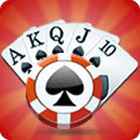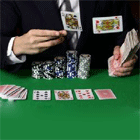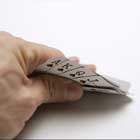学习扑克很多时间都是玩扑克游戏,但专家和新手的区别往往是在牌桌外研究游戏花费的时间。我说的不只是看书(虽然这肯定是重要的组成部分),因为很多人看过书,但却始终不擅长扑克。不,你需要从书籍上学习,而不仅仅是阅读它们。有一个巨大的差异,任何上过学的人(这可能包括你)都会明白我的意思。当然,我可以阅读整本书,我学过微积分,可能也相当快的。我可以感到懂得了作者所讲的,并没有真正的麻烦积分和导数的推理。但是,如果我光只是读它,我肯定会考试不及格的。我需要练习所学到的,以便充分吸收,因此,所有的数学课程(这也几乎适用于任何学科,但数学是一个方便的例子)提供问题给学生解决,帮助他们吸收他们刚刚学到的知识。
扑克书籍很少做到这一点,除了非常显著且值得称道的德州扑克系列的哈灵顿。很多其他的二加二出版的书籍在书末都有测验,以帮助您测试您的知识。但他们中的大部分都缺乏一个标准,使这本书本身包含了足够的材料以助于概念的吸收。因此,我们需要更努力地工作而不只是看书。事实上,没有一个严厉的老师和即将到来的测试,我们可能会不及格,凝聚动力强迫自己去进行所有的学习可能很难。
但我明白,你一定也明白,学习更多关于游戏的知识,这是我们的目的,我们能击败它。这样一来,问题不在于我们不知道如果我们努力学习,我们会更好。问题是艰苦的工作往往不好玩。我们需要动力,能够做到这一点,使需要时间和纪律的学习成为一种习惯。这是本课程的核心:实现学习需要一定的时间和相应的计划。
此外,我们必须认识到,在某些点上,学习并没有结束。我们不会毕业。我们在游戏中赚的钱来自别人犯的错误,我们在游戏中需要比别人犯更少的错误。或者更具体地说,成本更低也是我们利润。在其最好的竞争。但是,我们的对手不蠢(至少不是所有的人),随时间推移,蠢的人也越来越少,我们将限制。 他们过去的每一天,也在了解更多关于游戏的。为了保持我们的赢率,我们希望甚至在所有的地方不断赢,我们需要保持领先的曲线。我们需要知道比他们更多的游戏,我们需要比他们更努力。我们可以保持斗智斗勇。出于这个原因,有没有结束的迹象,没有灯光的隧道,也没有我们学习结束的一天。扑克游戏的学习是一个持续的过程。
译文:
Learning poker will take a whole lot of playing it, but what separates the experts from the novices is often the time spent on studying the game away from the table. I'm not just talking about reading books (although that is surely a big part of it) because lots of people read books but never excel at poker. No, you need to study the books, not just read them. There's a huge difference, and anyone who's ever gone to school (that presumably includes all of you) will know what I mean. Sure, I can read through the entire book I have on calculus, probably pretty fast, too. I can even feel like I get what the author is saying, and have no real trouble following the lines of reasoning about integrals and derivatives. But if all I do is read it, I'm going to flunk the test for sure. I need to practise what I've learned to fully absorb it, and so all math courses (this goes for virtually any subject, but math is a convenient example) supply their students with problems to solve, helping them to absorb the knowledge they've just read about.
Few poker books do this, with a very notable - and commendable - exception of the Harrington on Hold 'em series. Many of the other Two Plus Two publishing books have quizzes at the end to help you test your knowledge, but most of them fall hopelessly short of a standard that would allow the book itself to be enough material for absorbing the concepts it contains. Therefore, we need to work harder than just reading the books. In fact, without a stern teacher and an upcoming test that we may flunk, mustering the motivation to force ourselves to study at all may be hard.
But I realize - as do you, surely - that learning more about the game is the way we come to the point where we can beat it. And so the problem is not that we don't understand that we'd be better off if we study hard, the problem is that hard work is often not fun. We need to be motivated to pull it off, and making a habit out of studying takes time and discipline. That's the core of this lesson: Realize that learning takes time and plan accordingly.
Furthermore, we must realize that studying doesn't end at some point; we don't graduate. The money that we make in this game come from the mistakes of others and our job is to make fewer mistakes than our opponents - or more specifically, less costly ones - which is how we show a profit. Competition at its finest. But our opponents aren't dumb - well, not all of them at least, and the dumb ones become fewer and more far between as we move up in limits - and they learn more about the game for every day that passes, too. In order to keep our win-rate where we want it to be, or even keep winning at all, we need to stay ahead of the curve. We need to know more about the game than they do and we need to work harder than they do so that we can keep outsmarting them. For this reason, there's no end in sight, no light in the tunnel, no day when our job of studying is done. Learning is a continuous process in poker.



 德州扑克电影《Runner
德州扑克电影《Runner 百家乐高手教您澳门赌
百家乐高手教您澳门赌 在篮球投注网如何成为
在篮球投注网如何成为 扎金花实战必胜技术让
扎金花实战必胜技术让


